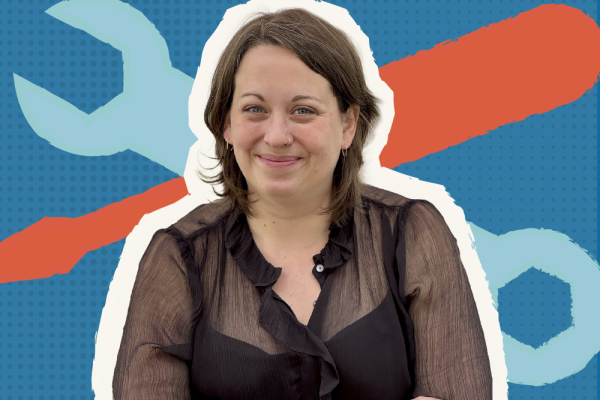One of the most powerful scenes in the new Apple TV+ docuseries Gutsy features Hillary Clinton interviewing Rev. Whittney Ijanaten, a Disciples of Christ minister who specializes in officiating LGBTQ weddings. At one point during the exchange, the tables turn, and Clinton submits herself to Ijanaten’s question about her own marriage to Bill Clinton. I’ll confess, I braced myself for some awkwardness; we all know much more about the Clintons’ marriage than we probably would like to. Yet, with grace and bravery, Hillary Clinton shares her own story of forgiveness and reconciliation. It’s a beautiful moment that reminds the viewer that Hillary Clinton is more than a politician and public figure — she’s an image-bearer of God, trying to live out her faith. It takes guts to ask one of the almost-leaders of the free world about her marriage; it takes guts to share something so personal with the world.
Gutsy introduces us to dozens of trailblazing women who are living lives of justice, truth, love, leadership, humor, and reconciliation. The show, produced and hosted by Hillary and her daughter Chelsea Clinton, while not explicitly “faith-based,” is rich with examples of women cultivating the common good. In a recent interview, Chelsea Clinton told me that there are as many ways to be gutsy “as there are women in all of our lives.”
Gutsy is organized into eight episodes, each highlighting a different “gutsy” characteristic: humor, reconciliation, justice, love, environmentalism, leadership, bravery, and motherhood. The Clintons interview musicians (Megan Thee Stallion), comedians (Amy Schumer, Wanda Sykes), actresses (Goldie Hawn, Kate Hudson), storytellers (Glennon Doyle, Amber Ruffin), activists (Jane Goodall and Quannah Chasinghorse), faith leaders, and refugees. The Clintons are fun to watch. Throughout each episode, there is delightful mother-daughter banter. It’s a refreshing glimpse into the lives of two women who have not always had the ability to present themselves on their own terms, but who have had to muster their own “gutsiness” in the face of scandal, media probes, and political partisanship. In one revealing scene, Chelsea Clinton admits that she was turned off to comedy for a long time, because as a child she was the butt of so many jokes.
Both Hillary and Chelsea Clinton cite faith as one of the motivations for their own “gutsiness.” “I feel very fortunate that I was raised in the United Methodist Church,” Hillary Clinton shared during our recent interview. “I'm a big believer in John Wesley's maxim: Do all the good you can for all the people you can for as long as you ever can. I really feel like I was raised with that kind of ethos. So it undergirds my life in my community, in my public service, in my professional work.”
That ethos is a thread linking each woman that Gutsy features. There’s the former white supremacist who mentors young people looking to leave neo-Naziism behind, by befriending them and introducing them to nature. There’s the trans woman offering a home and family to young LGBTQ youth. There’s the firefighter who blazed a trail into the New York Fire Department and now works to recruit and mentor other women. There’s the Indigenous judge who uses wellness and relationship as a means of rehabilitation for those experiencing addiction. Through their efforts, these “gutsy” women show what the world is like when image-bearers wield their power toward human flourishing, rather than selfish ends.
Most of the time, the Clintons do a good job of getting out of the way and centering their subjects' stories with compassion and empathy. The show's only flat notes occur when viewers are reminded that the Clintons are not just an adorable mother-daughter interviewing team; they are also representatives of political and state power. It’s hard to see Hillary Clinton as a neutral party discussing mass incarceration with criminal justice activists in episode 3, knowing her husband signed the 1994 federal crime bill. There’s a similar dissonance when watching Hillary Clintion speak with a queer widow in episode 4 who tells her about coming out during the 1996 Defense of Marriage Act. In the latter interaction, Clinton acknowledges that she changed her mind on same-sex marriage (partially attributed to Chelsea’s personal lobbying, it seems). But Hillary Clinton doesn’t acknowledge the hurt she contributed to: an increase in mass incarceration and the shame and exclusion of LGTBQ people. In some cases, the women in the show had to be gutsy as a way to overcome the challenges these Clinton-era policies brought into their lives.
Perhaps Gutsy is helping to right those wrongs. The hope, as Chelsea Clinton said during out interview, is that the show pushes viewers to “think about the ways they've been gutsy, and also to recognize the ways that others have often had to be gutsy and may continue to have to be gutsy.”
We’re living in a time in which it’s become far more socially acceptable to dismiss or shut down one’s political or religious opponents instead of engaging with them. It takes “guts” to lead with empathy and begin a conversation and recognize the image of God in another — even in people we perceive as enemies.
“I do think we need to be listening to each other and learning from each other much more today,” Hillary Clinton told me. “There's too many divisions between us, too many walls that we are constructing that really separate us from the full experience of what it means to be a woman, in not just the United States, but in the world today. I hope we can start a conversation, maybe a lot of conversations, because of it.”
Got something to say about what you're reading? We value your feedback!







